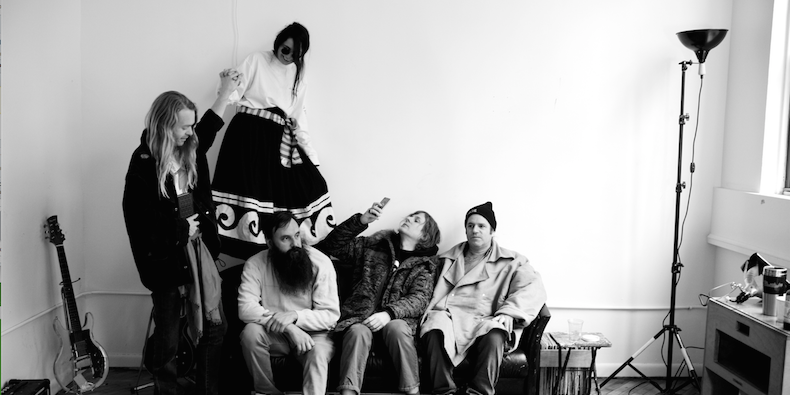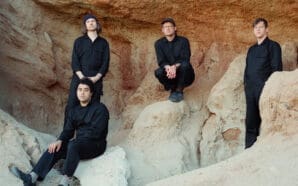This June NY experimental outfit Gang Gang Dance released their first album in seven years. Kazuashita (which roughly translates to “Peace Tomorrow”), is the follow-up to 2011’s critically acclaimed Eye Contact (both brought to us by 4AD). Although the band are best known for their improvisational techniques, Kazuashita has them taking on writing and recording with a different approach, and outlets like Pitchfork, Bust, and Brooklyn Vegan have already expressed great appreciation for the album.
Gang Gang Dance are about to kick off a short US tour which, in addition to Hopscotch in Raleigh, will have them in charmingly intimate rooms. This Thursday, September 6th, they will kick things off at our very own Boot & Saddle. Earlier today, Gang Gang Dance co-founder Brian DeGraw took some time to tell me about Kazuashita, and their current approach to making music in general.
Izzy Cihak: You recently released your first album in more than half a decade, which seems like a pretty big deal. Have you had any favorite reactions to it?
Brian DeGraw: I would say a lot of my favorite reactions have been from people who seem to have understood the intention of the content. I have really enjoyed speaking to people who recognize that the arc and sequencing of the album create a very subtle and intentionally blurry narrative. It’s there, but it’s not in your face.
The narrative aspect is meant to feel almost like when you awaken from a dream and can’t quite remember all the details, but the feeling still has you in its grip. I’ve been really pleasantly surprised to hear about it having that effect on people.
Izzy: How do you feel like Kazuashita compares to your previous work? Do you feel like a significantly different band than that which recorded Eye Contact? I know you’ve said that there was a lot less improvisation this time around than you were previously used to when writing and recording.
Brian: I think it’s a much different record from our previous ones and I’m very pleased about that. The working process was drastically different for us this time around… much, much less improvisation, yes. It felt very difficult and limiting at times, but ultimately, I am grateful that we were forced by circumstance into creating something outside of our go-to process. I think if this didn’t happen, we would have risked making something that may have felt like a repeat of the past, and that doesn’t really interest me right now. Moving forward and discovering new approaches and sounds is exciting and I hope to continue exploring different ways to make records.
Izzy: On the other side, do you have any songs, or even albums, from your back catalogue that you’re currently exceptionally proud of or excited about, whether they’re long-time favorites, or things that you recently decided are some of your proudest moments?
Brian: I really like God’s Money and Eye Contact. Both of those records contain some of the moments I’m most proud of and they also seem to hold the strongest sentimental and emotional attachment for me, personally. I think if I had to choose one, it would be God’s Money. Not completely for the way it sounds, but more for what it stands for in our personal history. That was a really important record for us in so many ways and it’s the one that allowed us to start traveling and seeing the world, which is something I’m forever thankful for.
Izzy: You’ve always cut across genres to a pretty profound degree, so I’m curious what kinds of things you’re listening to most these days, whether they’re directly influencing you or not? (Having asked that, I realize that you’ve said that basically the biggest issue you had with your solo record is that, while constructing it, you were too busy listening to music and not concerning yourself enough with making it.)
Brian: Yeah, none of us have ever really been tied down by the concept of genre. I think ultimately that is a big part of what makes us what we are. A lot of bands seem to have a preconceived idea of the way they want to sound, and they have very direct reference points that they look to as their guideline, but we have never done that. It’s not that we don’t consider other music when we play, but there’s just so much music from all over the world and from all walks of life that we feel a connection with, so it all just gets filtered through our soul and whatever happens happens. I think that’s another reason that improvisation has so often be the root of our process. Sometimes it just makes sense to simply be free and know that all of these numerous influences are just going to naturally flow through us in a very organic way, rather than forcing a way to ensure that all the influences gets heard.
As of lately, I’ve been mostly listening to soundtracks. A lot of Ryuchi Sakamoto, Mica Levi, Hans Zimmer, and a bunch of horror soundtracks, as I am currently working on one myself. Also, have been enjoying the Jon Hopkins record a lot and lots of Mad Professor live dubs.
Izzy: What would you consider to be Kazuashita’s most significant non-musical influences? In most of your recent interviews I’ve seen the interviewer touching on larger things, like the “current state of the world,” but are there any particularly specific aspects of the human experience in 2018, or even non-musical works of art, that inspire you to a significant degree?
Brian: I have been relating music to cooking a lot lately. I’ve always been someone who cooks a lot and over the past few years it really started to influence the way I think about music. I find myself equating flavors, textures, colors, and scents of food to different aspects of sound. It’s been really helpful in the mixing process, especially. You know how some people use those Brian Eno Oblique Strategy cards when they are stuck on something? I tend to use cooking in much the same way. I will picture a song being a certain dish and, by thinking about what elements of that dish make it successfully balanced, I can find a similar way to balance a mix.
I think with Kazuashita Lizzi was very much inspired by politics and everything that was going on around us culturally during the few years we worked on it. I think that coming to terms with the horrors of social media also may have bled into the record for all of us… just how difficult it has become to be an escapist. Not that that is necessarily always a good thing to be, but it’s comforting to have the option and I think phone addiction has taken a lot of that option away for a lot of people. Some might argue that the ones that are hypnotized by the phone are actually the escapists, but to me it just feels like we are being pulled into a state of submission. It can be a very lonely place. I think ultimately digital consumerism truly wants us to feel alone.
Izzy: So, this is a super personal question but, in your interview with Tiny Mix Tapes, you’re critical of addiction to social media, but also admit to having a fear of having a simple flip phone and missing out. So, I’m curious what you think of people, like myself, who have never had a smartphone and still cling to a previous generation (Additionally, I still listen to CDs and watch DVDs, but, as a child of the ‘80s, have a hardcore TV addiction.) I think people like me might be ignorant and rebellious in equal measures.
Brian: I think you are doing the right thing. If you had the foresight not to get pulled into it all in the first place, then it just says something about your natural state of being and how you prefer to live your life. There are things about Instagram that I like… the fact that I can exchange images of art with people from all over the world. I sincerely find a lot of pleasure in that. I think it’s a great tool for having a dialogue about art and I am also happy to see examples of young people who have made some sort of life for themselves financially, who might not have been afforded the opportunity to otherwise. The addiction side is where it all gets a bit dark though. I suppose in the end it’s all up to the individual to regulate it.
Izzy: So, this is quite general, but what can be expected of the live show when you play here at Boot & Saddle?
Brian: We are playing songs spanning from 2004 until now, so it runs the gamut really. We are really excited to play smaller rooms! Many of the shows lately have been in very big rooms or outdoor stages where sound and energy has been difficult to control, so it’s really going to be a treat for us to play in tighter spaces and feel more of the exchange between ourselves and the audience.
Izzy: And, finally, what’s next for Gang Gang Dance?
Brian: After this tour we will be working on a live performance with a dance troupe at the MOMA for part of their upcoming exhibit on the Judson Dance Theater. We are also putting together the pieces of an album-length film version of Kazuashita that involves several collaborators and working on an exhibit based around our archives that we have kept since the band started in 2000. More on all that soon!








